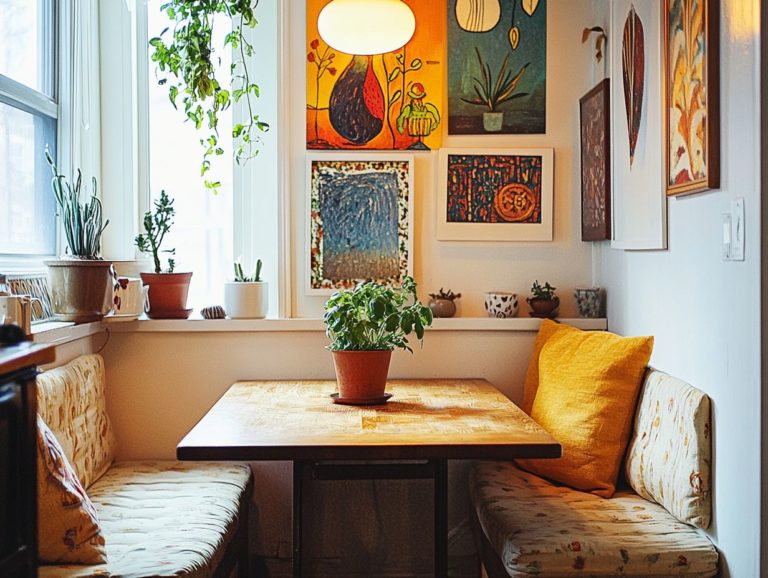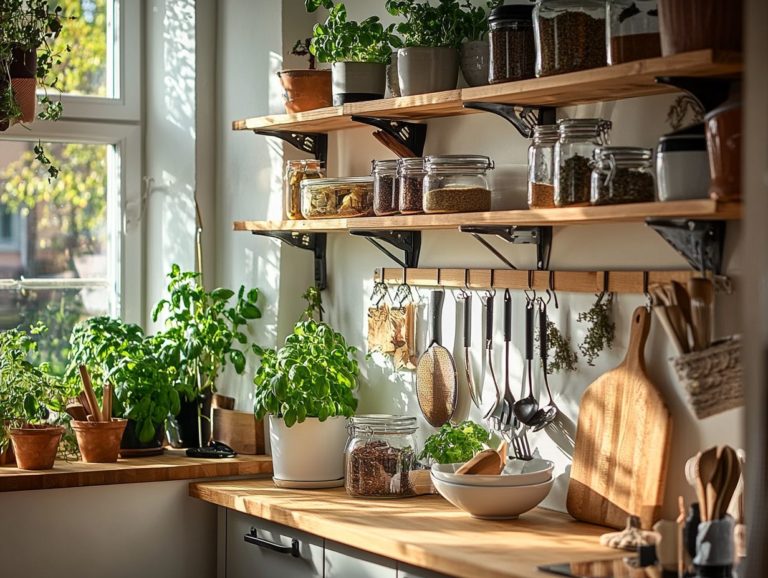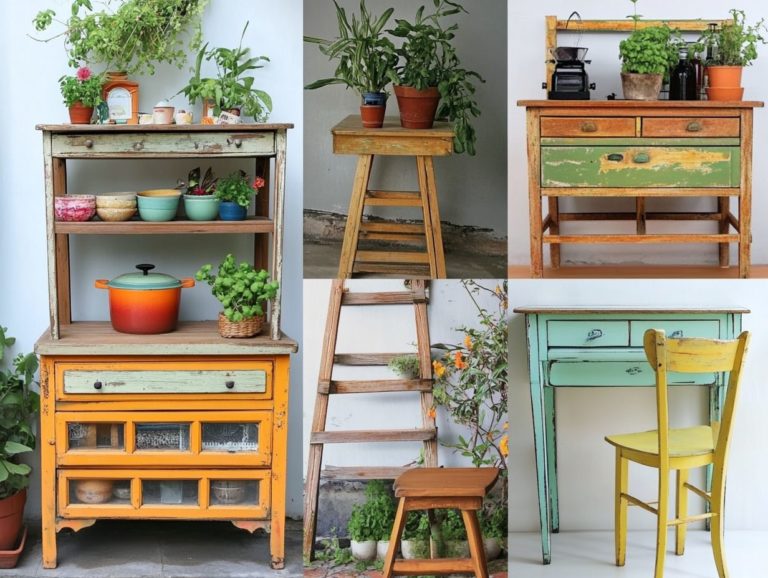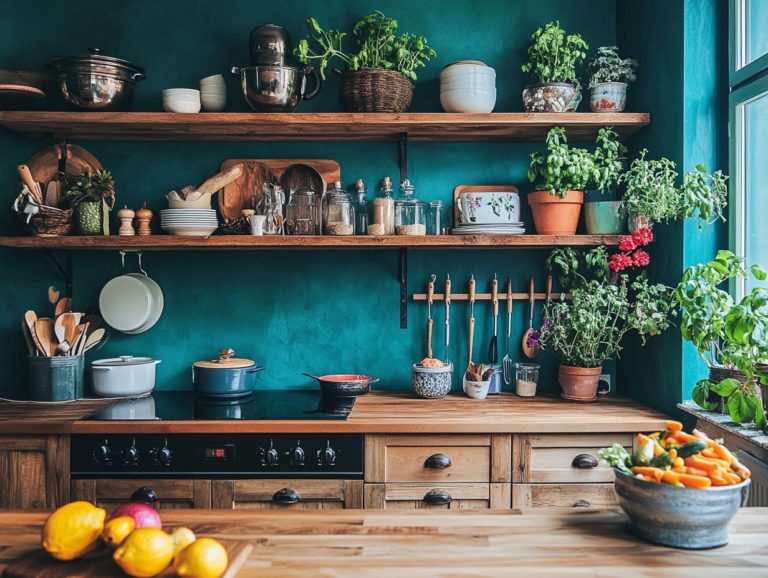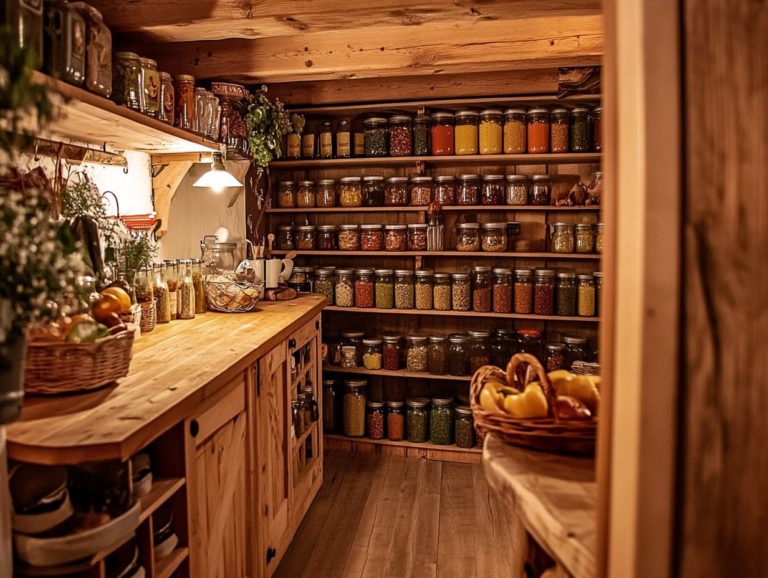DIY Ideas for a Sustainable Kitchen
Creating a sustainable kitchen is not merely a passing trend; it is a lifestyle choice that can profoundly affect both your home and the planet. This guide is packed with exciting, practical tips that will transform your kitchen!
From upcycled decor to homemade cleaning products, you have a wealth of DIY ideas at your fingertips to transform your kitchen into an eco-friendly sanctuary. You’ll uncover methods to reduce waste, save money, and even cultivate your own herbs.
Whether you are embarking on a renovation or simply aiming for small changes, dive in and discover how your kitchen can evolve into a greener, healthier space!
Contents
- Key Takeaways:
- 1. Upcycled Kitchen Decor
- 2. Homemade Cleaning Products
- 3. Composting for a Greener Kitchen
- 4. Reusable Kitchen Products
- 5. Grow Your Own Herbs and Vegetables
- 6. Energy-Efficient Appliances
- 7. Reduce Food Waste with Meal Planning
- 8. Use Sustainable Materials for Kitchen Renovations
- 9. Eco-Friendly Kitchen Gadgets
- 10. Sustainable Cooking Practices
- How Can a Sustainable Kitchen Benefit the Environment?
- Frequently Asked Questions
- What are some simple DIY ideas for a sustainable kitchen?
- How can I reduce my food waste in the kitchen?
- What are some eco-friendly alternatives to plastic wrap?
- How can I make my kitchen more energy efficient?
- What are some DIY ideas for repurposing old kitchen items?
- How can I incorporate sustainable materials into my kitchen renovation?
Key Takeaways:
- Upcycle old items in your kitchen for unique and sustainable decor.
- Create homemade cleaning products to reduce waste and harmful chemicals.
- Compost food scraps for a greener kitchen and healthier plants.
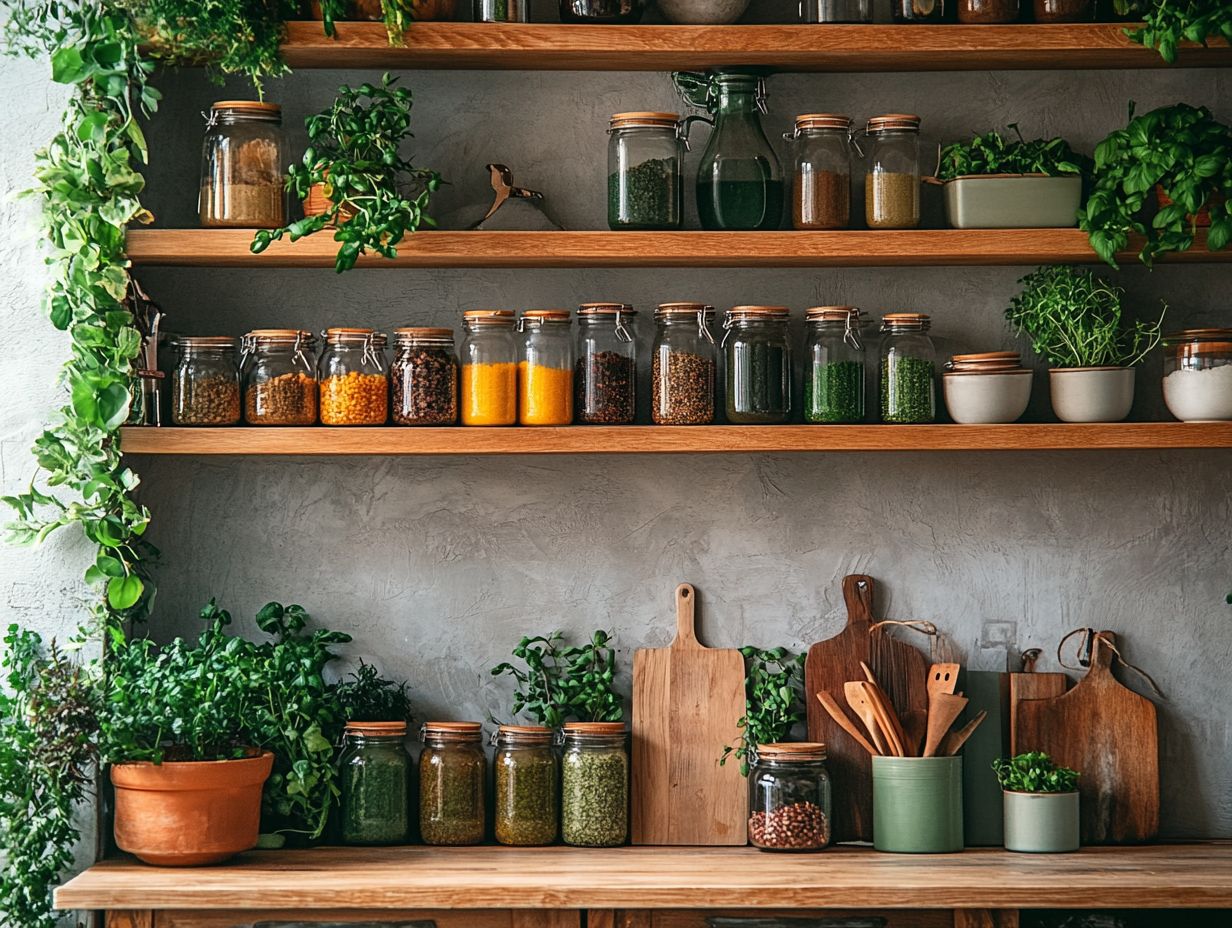
1. Upcycled Kitchen Decor
Transforming your kitchen into a sustainable haven is entirely within your reach through the creative use of upcycled decor. This approach not only elevates the style of your space but also champions eco-friendliness and resource efficiency.
The beauty of upcycling lies in its ability to breathe new life into antique furniture and vintage finds. You can curate unique pieces that reflect your personal aesthetic while embracing sustainable living.
By incorporating reclaimed materials into your kitchen decor, you contribute to carbon neutrality and reduce waste. Each item becomes a testament to eco-conscious living.
For instance, why not transform an old wooden dresser into a charming kitchen island? With a fresh coat of paint and a butcher block countertop, it can provide additional workspace while serving as a delightful conversation starter.
You can also stack vintage crates to create rustic storage solutions that keep your cookbooks and utensils organized. This adds character to your kitchen.
Incorporating reclaimed wood as open shelving enhances modern aesthetics. Upcycled metal can provide a striking contrast to sleek appliances, proving that sustainability and style can coexist beautifully.
2. Homemade Cleaning Products
Creating your own homemade cleaning products is a fantastic way to maintain an eco-friendly kitchen while keeping harmful chemicals at bay. Make your kitchen healthier today!
By using simple ingredients like vinegar, baking soda, and essential oils, you can effectively tackle grime and stains without reaching for those plastic-packaged commercial products. These natural solutions cut down on plastic waste and reduce your exposure to toxic additives often lurking in store-bought cleaners.
For instance, a mix of vinegar and water serves as a powerful disinfectant for your countertops. A sprinkle of baking soda works wonders on tough spots, banishing stubborn residues.
Adopting these practices encourages a mindful approach to cleaning. This fosters a more sustainable lifestyle that benefits both your well-being and the planet.
3. Composting for a Greener Kitchen
Composting presents a refined solution for minimizing food waste in your kitchen while enriching your garden. It aligns seamlessly with eco-friendly kitchen practices that foster a sense of environmental responsibility.
You will find composting methods, such as vermicomposting and bokashi systems, that effortlessly integrate into your daily kitchen routine. This makes the process not only convenient but also efficient.
Vermicomposting uses worms to break down organic matter quickly. Bokashi is a method that can compost food scraps, including meat and dairy.
These methods do not just reduce waste; they play a pivotal role in promoting carbon neutrality by returning vital nutrients to the soil.
When you combine these practices with energy-efficient appliances, you unlock a holistic approach to sustainable living. Small changes can have a profound impact on our environment.
4. Reusable Kitchen Products
Incorporating reusable kitchen products into your home reduces your impact on the environment and embraces a sustainable design ethos that encourages environmentally conscious living.
Items like beeswax wraps and stainless steel straws serve as stylish alternatives to single-use products. They help you minimize plastic waste while elevating your daily tasks!
By opting for durable glass containers, you can store leftovers or meal prep essentials without the worry of harmful chemicals leaching into your food.
Each time you reach for these reusable items, you keep your kitchen free from plastic waste. You also remind yourself of the importance of making thoughtful choices that benefit both your health and the planet!
Investing in long-lasting kitchen essentials is a small yet powerful step toward fostering a greener lifestyle.
5. Grow Your Own Herbs and Vegetables
Growing your own herbs and vegetables in your kitchen elevates your cooking experience and fosters a sustainable kitchen environment. You’ll relish the freshest ingredients while effortlessly reducing your carbon footprint!
With container gardening—growing plants in pots—even if your space is limited, you can craft a vibrant mini-garden. Consider utilizing:
- Pots on your windowsills
- Vertical planters
- Hanging baskets
These options conserve space and infuse your home with a delightful touch of greenery. Tending to these plants offers a rewarding and therapeutic experience!
Cultivating your own produce ensures you know exactly what goes into your meals, prioritizing health and flavor. Growing your own produce supports your health and creates a sustainable lifestyle by minimizing transportation emissions and reliance on processed goods.
6. Energy-Efficient Appliances
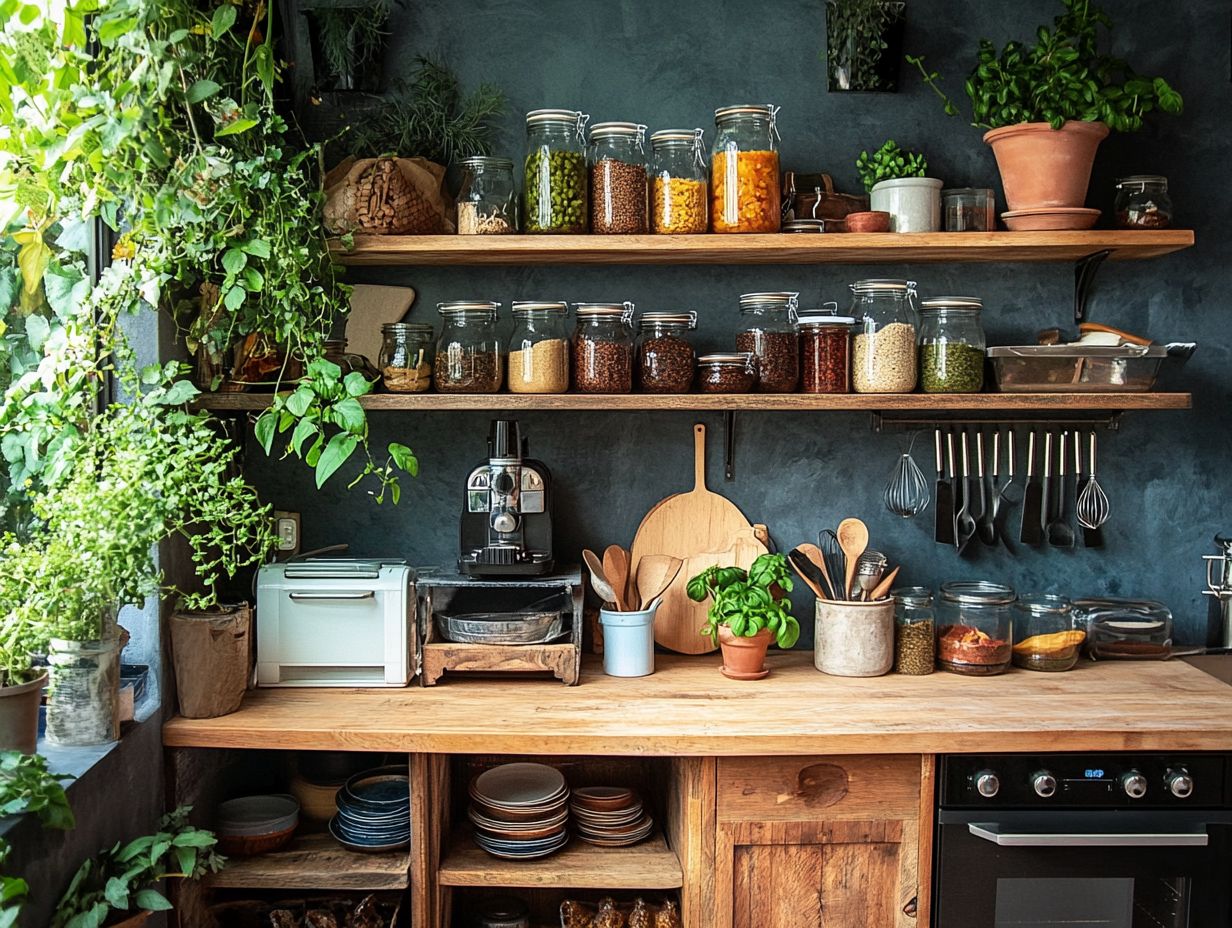
Investing in energy-efficient appliances is a smart move! This essential step crafts a sustainable kitchen that conserves resources while trimming down your utility bills over time.
By selecting Energy Star-rated options—certified for energy efficiency—you can reap the rewards of reducing your carbon footprint and saving money simultaneously. For example, an Energy Star refrigerator consumes significantly less energy than traditional models, leading to noteworthy savings on your electricity bills!
Energy-efficient dishwashers save water and energy without losing performance. As these appliances operate over their lifespan, the cumulative savings can be impressive, making the initial investment worthwhile!
Opting for these eco-friendly choices nurtures a greener environment and enhances the overall functionality of your kitchen.
7. Reduce Food Waste with Meal Planning
Implementing effective meal planning strategies can greatly reduce food waste in your kitchen, perfectly aligning with the principles of a sustainable kitchen and eco-friendly living!
By incorporating techniques like batch cooking, you prepare meals in advance to save time during the week. This ensures that your ingredients are utilized efficiently, minimizing spoilage.
Opting for seasonal produce enhances the freshness and flavor of your meals while supporting local farmers and reducing the carbon footprint associated with transportation.
These practices streamline your cooking process, allowing appliances to operate more efficiently and inspiring a creative approach to repurposing leftovers.
As a result, you can savor nutritious, flavorful dishes while contributing to a more sustainable food system. Start today!
8. Use Sustainable Materials for Kitchen Renovations
When you’re considering a kitchen renovation, opting for sustainable materials allows you to embrace eco-conscious living while enhancing both the value and style of your home.
Imagine selecting reclaimed wood, which not only adds unique character and history but also infuses warmth into your space.
Or think about bamboo flooring—it’s a sustainable alternative to traditional hardwood that brings a fresh vibe.
FSC-certified plywood is another fantastic option. It ensures that the wood you choose comes from responsibly managed forests. As you delve into these materials, keep in mind how they align with your modern design aesthetic.
Seek out finishes and colors that resonate with your vision. Prioritize products backed by certifications that affirm their positive environmental impact.
This careful selection process will not only elevate the beauty of your kitchen but also contribute to a healthier planet.
9. Eco-Friendly Kitchen Gadgets
Integrating eco-friendly kitchen gadgets into your culinary space can enhance your cooking experience while promoting sustainability and energy conservation.
For example, when you install smart faucets, you significantly reduce water waste by adjusting the flow according to your needs.
These innovative devices conserve this vital resource and add a touch of modern elegance to your kitchen’s aesthetic.
Energy-efficient kitchen appliances, like induction cooktops and air fryers, consume less electricity while delivering exceptional results, making them perfect for the environmentally conscious chef.
Consider utensils made from recycled materials; they not only minimize landfill waste but also add unique charm and history to your kitchen.
Together, these gadgets optimize your cooking tasks and contribute to a healthier planet, making your culinary journey both enjoyable and responsible.
10. Sustainable Cooking Practices
Adopting sustainable cooking practices is essential for minimizing your environmental impact and maximizing the use of energy-efficient appliances.
By using fresh, local ingredients, you elevate the flavors of your meals while supporting local farmers and reducing the total amount of greenhouse gases produced by food transportation.
Choosing reusable containers over single-use plastics fosters a healthier environment and promotes mindful consumption.
You can easily integrate these practices into your daily routine, transforming sustainability from a lofty ideal into an attainable goal for every home cook.
How Can a Sustainable Kitchen Benefit the Environment?
A sustainable kitchen does more than just promote your personal health and well-being; it plays a vital role in protecting the environment.
By adopting practices that help achieve carbon neutrality and reduce waste through eco-friendly choices, you’re making a significant impact.
Selecting energy-efficient appliances and utilizing reclaimed materials allows you to create a stylish and sustainable space, effectively aiding in the fight against climate change.
Embracing eco-conscious living by using natural materials and minimizing food waste amplifies the positive effects your kitchen has on the planet.
By using less energy, you not only save money but also make a big difference!
In the grand scheme of things, your sustainable choices support global initiatives to combat climate change.
A decreased demand for non-renewable energy sources can lead to improved air quality and less habitat destruction.
Ultimately, every small habit you adopt in your kitchen holds the potential to enhance environmental health and inspire collective action toward a sustainable future.
What Are the Most Harmful Kitchen Habits for the Environment?
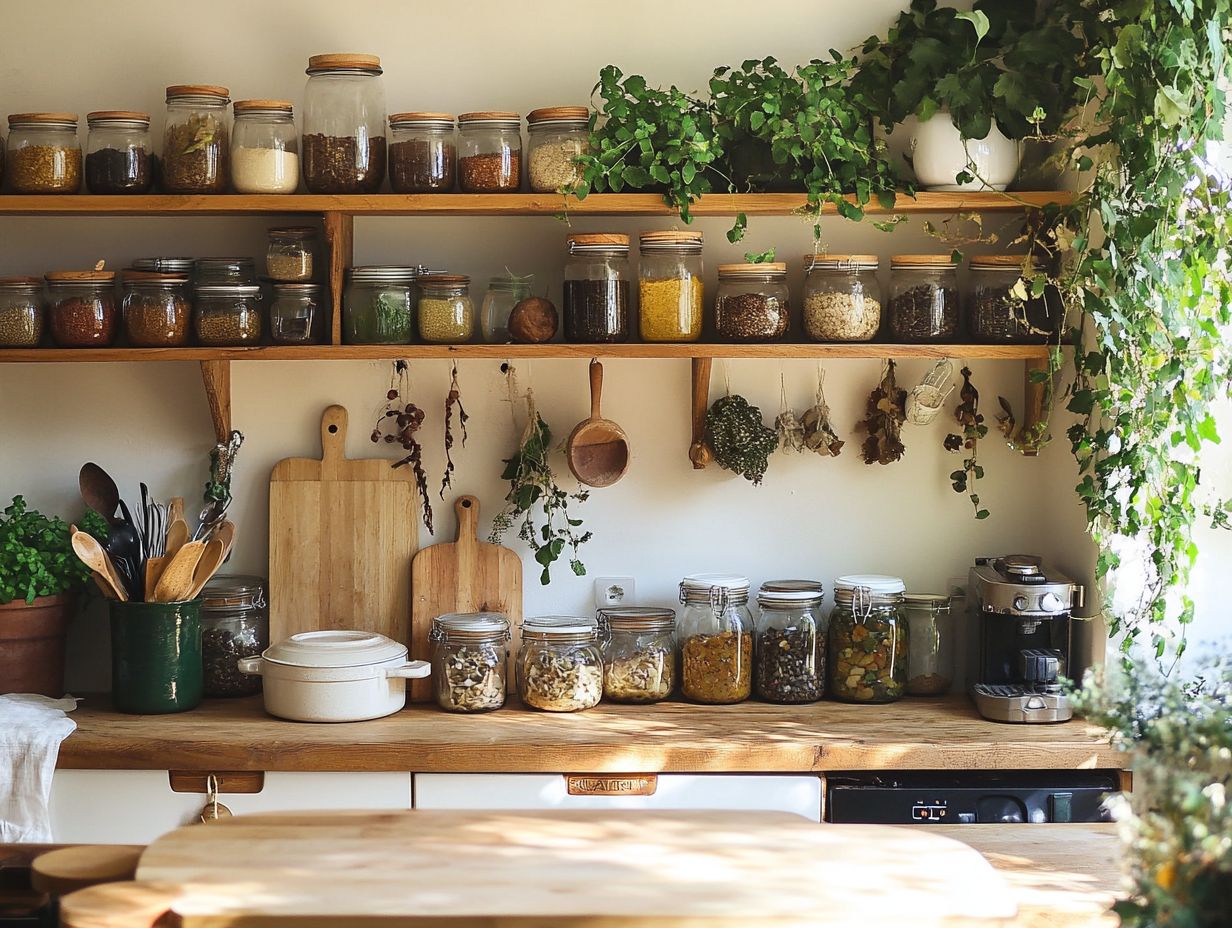
Certain kitchen habits can harm the environment. It’s essential to identify and change these practices to create a sustainable kitchen.
For example, food waste overwhelms landfills and boosts greenhouse gas emissions. Planning meals better can help reduce this waste.
Single-use plastics like disposable cutlery and straws worsen the plastic pollution crisis. Choose reusable alternatives to make a difference.
Toxic cleaning products release harmful chemicals into air and water. This creates an unhealthy environment for your home and the planet.
By choosing green cleaning solutions, composting, and using glass containers, you can lower your ecological footprint. This change benefits you and future generations!
How Can a Sustainable Kitchen Save Money in the Long Run?
A sustainable kitchen is great for the environment and your wallet. It can lead to significant savings over time.
Investing in energy-efficient appliances can reduce your utility bills. You’ll also waste less energy!
Choosing ENERGY STAR-rated models saves energy and often qualifies for rebates. Upgrading to water-efficient fixtures helps you save on water bills.
These kitchen improvements boost functionality while contributing to long-term savings. Eco-friendly choices are financially smart!
What Are Some Sustainable Kitchen Ideas for Renters?
Renters can embrace practical sustainable kitchen ideas. You don’t need permanent renovations to create an eco-conscious kitchen.
Incorporate multifunctional ranges to maximize limited space. This also cuts down on energy use!
Use collapsible utensils and compact appliances to keep your kitchen clutter-free. These choices support a sustainable lifestyle.
Reusable products like silicone bags and beeswax wraps reduce waste. They also show your commitment to being eco-friendly!
These changes empower you to transform your kitchen on a budget. Sustainable living is achievable without overspending or making permanent changes!
How Can a Sustainable Kitchen Lead to a Healthier Lifestyle?
A sustainable kitchen can enhance your physical well-being. It promotes clean cooking practices and the use of natural materials.
Choosing fresh, seasonal ingredients nourishes your body with essential vitamins. You also support local farmers, minimizing transportation’s carbon footprint.
This focus on wholesome foods can lower your risk of dietary-related illnesses. It boosts your energy levels!
Eco-conscious living deepens your connection to your surroundings. Preparing meals with care fosters mindfulness and satisfaction beyond the kitchen.
What Are Some Common Misconceptions About Sustainable Kitchens?
Several common misconceptions about sustainable kitchens might hold you back from fully embracing eco-friendly practices. These misunderstandings can create confusion about what truly defines a sustainable design.
Going green doesn’t have to break the bank or compromise your style. You can have an eco-friendly kitchen that’s both beautiful and budget-friendly! Incorporating energy-efficient appliances not only cuts your utility bills but also enhances the overall aesthetic of your kitchen with sleek, modern designs.
Eco-friendly products, like bamboo countertops and recycled glass backsplashes, blend beauty and functionality while promoting a healthier environment. Let’s clear up these myths and show you how a sustainable kitchen can be fabulous and affordable!
Frequently Asked Questions
What are some simple DIY ideas for a sustainable kitchen?
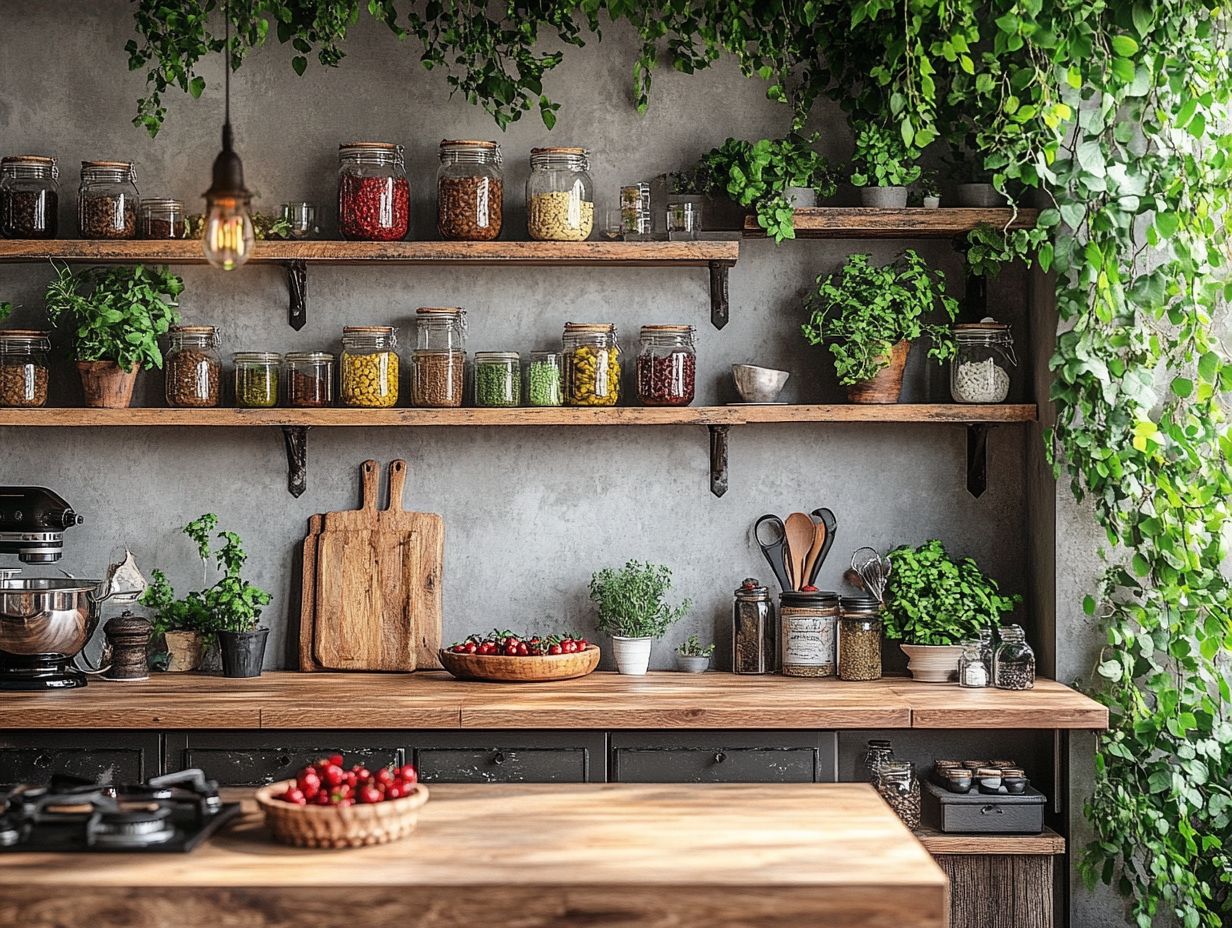
Some simple DIY ideas for a sustainable kitchen include creating your own natural cleaning products, using reusable containers for food storage, and making your own compost bin.
How can I reduce my food waste in the kitchen?
You can reduce your food waste by planning your meals ahead of time, using up leftovers, and composting any food scraps instead of throwing them away.
What are some eco-friendly alternatives to plastic wrap?
Some eco-friendly alternatives to plastic wrap include beeswax wraps, silicone lids, and reusable food storage containers.
How can I make my kitchen more energy efficient?
Make your kitchen more energy efficient by switching to energy-efficient appliances, utilizing natural lighting instead of artificial lighting, and only using your dishwasher when it’s full.
What are some DIY ideas for repurposing old kitchen items?
Some DIY ideas for repurposing old kitchen items include turning old mason jars into herb planters, using old utensils as wall decorations, and repurposing old kitchen towels as cleaning rags.
How can I incorporate sustainable materials into my kitchen renovation?
You can incorporate sustainable materials into your kitchen renovation by using recycled or reclaimed materials, choosing energy-efficient appliances, and opting for low-VOC (volatile organic compounds) paint and finishes.
